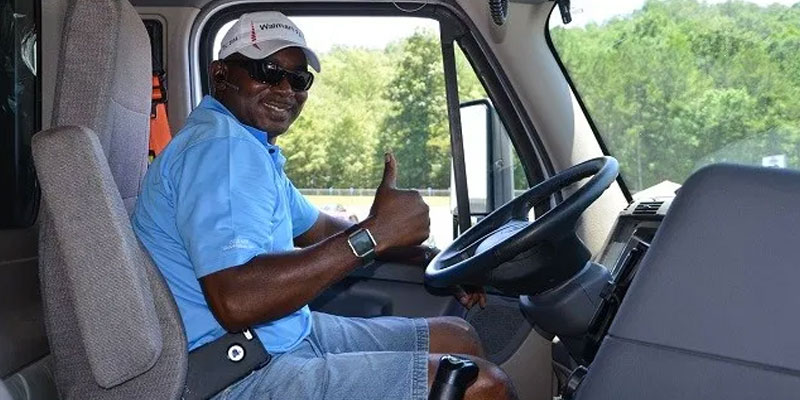Truckin’ is an American tradition, the subject of Eddie Kendricks and Grateful Dead tunes, a Robert Crump cartoon character strutting confidently across the continent, and today an industry needed more than ever.
Truckers transport a high percentage of almost every American product, a much larger amount than by any other means of pickup and delivery. Truck drivers work long hours in a perilous profession, where the danger level has ramped up because they must continue going on the road and into harm’s way at hospitals and other coronavirus hotspots.
The trucking industry adage “If you bought it, a truck brought it” is especially meaningful when much of America is sheltered in homes. While FedEx and UPS hold the largest share of giant company business nationwide, small companies and independent drivers are the heart of trucking. There are more than 9,000 locally owned and operated trucking businesses in Alabama.
“Thank you for continuing to Keep America Moving during this unprecedented time in our Nation,” Daniel Wright wrote to his 220 employees. “You are an essential part of the supply chain, and without you our stores would be empty, our medical supplies wouldn’t get delivered and our farmers would not have feed.”
The president of Wright Transportation in Mobile said the company founded by his father in 1999 has 350 trailers and 190 trucks traveling across the continental U.S. delivering crucial goods around the clock. Wright said it is now “very important” that all of his company drivers have quick access to their company president.
“I personally called each employee to make sure they have an understanding of our role in this pandemic and how important their job is,” Wright said. “I also made sure that they have my personal cellphone number and for them to call me at any time with concerns and questions.”
One in 15 jobs in Alabama is in the trucking industry, which delivers more than 80% of everything rolling into and out of the state, said Mark Colson, president and CEO of the Alabama Trucking Association (ATA). The organization has represented truckers for 82 years, but Colson said those 170,000 workers in Alabama include diesel techs, fleet managers, software engineers and others who are more driven than ever to help America.
“First and foremost, we want everyone to know trucking is open for business and an essential business,” Colson said. “Through good times and bad, on an average day or when a crisis occurs, we’re moving America efficiently and safely.”
The trucking industry pays about 40% of all taxes owed by Alabama motorists: a typical five-axle tractor-semitrailer owner pays about $15,000 annually in state and federal highway user fees and taxes. Alabama has about 100,000 miles of public roads, with all motorists traveling about 65 billion miles, 10% of which is by truckers.
Wright said Alabama truckers are proud to be essential providers “to support the people of this wonderful nation.” He said most of their customers are essential providers working outside the national quarantines. His priority beyond on-time deliveries is ensuring Wright Transportation employees stay safe and healthy.
“It’s not time to panic, it’s time to prepare and make healthy decisions,” he said. “We have a job to do and our nation is depending on us to do our job.”
Colson, who took the wheel at ATA last year after leadership roles with the Business Council of Alabama, said his organization has been working with Gov. Kay Ivey as well as state and federal agencies to address issues affecting truckers during the pandemic. He said emergency orders have made allowances in special situations for larger truck weights and longer driver hours to ensure that emergency relief goods are promptly delivered. Extensions have been granted for expiring commercial driver’s licenses and medical certifications.
Should the shutdowns continue longer than expected, Colson said commercial driver’s license testing sites will become an issue, since all are closed in Alabama and more than 20 other states at present. There is already a truck driver shortage, so state and federal officials are exploring options to certify new drivers. Colson said people who have lost jobs nationwide should consider the trucking industry for employment.
“A young woman in our industry told me, ‘Look at me. I’m not driving a truck but I’m a trucker,” Colson said, referring to the many positions available outside of driving a tractor-trailer rig. He noted that ATA board chairman Tom McLeod’s Birmingham business McLeod Software has about 600 employees developing trucking industry software.
But most truckers don’t have the option to telecommute.
“We were built for this,” said American Trucking Associations CEO Chris Spear in a post this week. “Let’s keep rolling.” He said resourcefulness, sacrifice and resilience “are deeply rooted in the trucking industry” and that truckers “have an enormous role” in the fight against COVID-19.
Truckers have been urged by state and national organizations to go beyond the health recommendations for average Americans who are sheltering in place. In an industry driven by handshakes, truckers are finding other ways to make a deal and get back on the road while keeping their customers safe.
More than 90% of trucking companies nationwide have fewer than six trucks. Lakeview Transportation in Selma fits the bill, with five trailers, four trucks and four drivers. Opened three years ago, Lakeview delivers within a 300-mile radius and has found some customers are taking no chances with coronavirus. Where drivers previously went inside destination offices to have paperwork signed, Lakeview owner Renee Craig said since the pandemic began everything is handled by email from start to finish.
“Our customers have changed their procedures as far as accepting deliveries,” Craig said. “They don’t want drivers getting out of their trucks. It’s been a big adjustment as far as that goes.”
Two huge banners on the side of the ATA headquarters alongside Interstate 85 in Montgomery show a photo of Birmingham’s J & M Tank Lines driver Darrien Henderson noting the hashtag #ThankATrucker and the motto Keep Calm and Keep Trucking. Eddie Kendricks would approve.
(Courtesy of Alabama NewsCenter)













